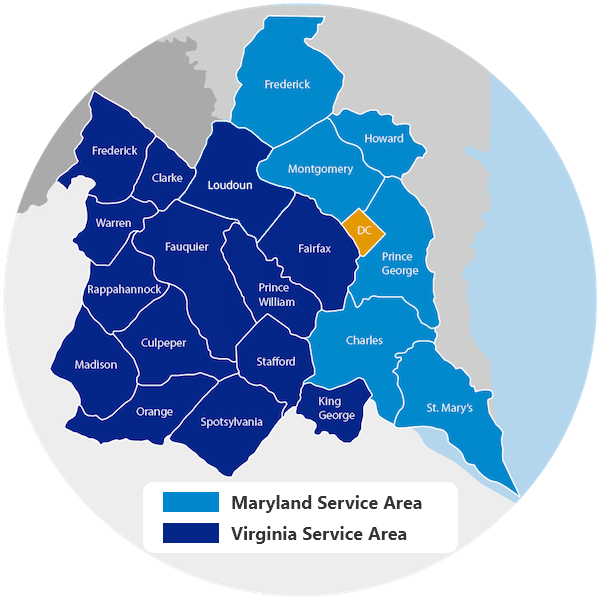The Washington, DC metropolitan area is known for hazy, hot and humid summer weather. It's also known for severe thunderstorms, tropical storms, hurricanes, tornadoes â and even derechos. These powerful storms can not only ruin outdoor plans, they can also damage houses and yards â and endanger you and your loved ones.
This is the third of three blog posts on preparing for powerful storms. Here's what you need to know to protect your family and keep your home safe after the next severe summer storm.
Downed power lines. After a storm, be on the lookout for downed electric wires. If you see a downed power line, consider it energized and dangerous. Stay clear, stay safe and notify your local power company and the police immediately.
â Stay at least 50 feet from downed wires and anything they are in contact with, including puddles and metal fences.
â Keep children inside and pets on a leash.
â Don't drive over downed power lines. Even if they're not energized, the lines could get entangled in your vehicle.
â If a fallen wire is touching your car, don't get out. Call 911 and wait for emergency personnel to arrive. If you must get out of the car because of a fire or other life threatening situation, use extreme caution. Leap far and free of the vehicle, with no part of your body or clothing touching the vehicle and the ground at the same time. Then shuffle away from the car, keeping both feet close together to minimize the path of electric current and avoid electric shock.
â If you see a fallen wire draped over a car, don't approach the car or make rescue attempts. Stay a safe distance away, try to keep the driver and passengers calm and call 911. Wait for emergency responders to handle the situation.
Flooded homes. Don't enter your home if it is still flooded or surrounded by floodwater. If the water is gone, check for structural damage, such as foundation cracks, and turn off outside gas lines at the meter tank before entering. Then:
â Wear sturdy shoes to avoid cuts.
â Use battery-powered lighting in case flammable material is present.
â Look for fire hazards, such as damaged gas lines, flooded electrical circuits or submerged furnaces.
â Check for gas leaks. If you smell gas or hear a blowing or hissing noise, open a window and leave the building. Once safely outside, call your gas company.
â Check for electrical system damage, like sparks, the smell of burning insulation or broken or frayed wires. Turn off the electricity at the main circuit breaker if you can reach it without stepping in water.
â Examine walls, floors, doors, windows and ceilings for risk of collapse.
â Watch out for animals that might have entered with the floodwaters.
â Let the building air out to remove foul odors or escaping gas.
Insurance. After a storm, take pictures of any damage to your home and its contents â you'll need them for insurance claims. Be sure that you know what is covered by your insurance policy and under what terms. Many policies only cover the contents within your home, not what is in an ancillary structure, such as your garage and shed.
Weather is unpredictable, but summer storms are inevitable. The best plan for homeowners is to be prepared. Before a storm strikes, prepare an emergency kit, create an evacuation plan, and contact a waterproofer  to help fix potential problems in your home or yard as soon as possible. During the storm, put safety first â shelter in place, pay attention to flash flood warnings and use your emergency kit to manage power outages. After the storm, be cautious around downed power lines and flooded buildings. When possible, take photos of any damage to submit for insurance claims. By taking the proper safety precautions, you can keep yourself and those around you protected before, during and after storms strike.
To find out how NV Waterproofing can help you prepare your home and yard for powerful summer storms â and help prevent wet basements and other water damage â visit nvwaterproofing.com or call 1-571-570-3118.
Disclaimer of Liability
The information in this blog is provided for general guidance only and does not constitute the provision of legal, engineering, architectural, professional or healthcare advice. The information provided herein should not be used as a substitute for consultation with professional advisers. Before making any decision or taking any action, you should consult a professional adviser who has been provided with all pertinent facts relevant to your particular situation. The information is provided âas is,â with no assurance or guarantee of completeness, accuracy or timeliness of the information, and without warranty of any kind, express or implied, including but not limited to warranties of performance, merchantability and fitness for a particular purpose.



